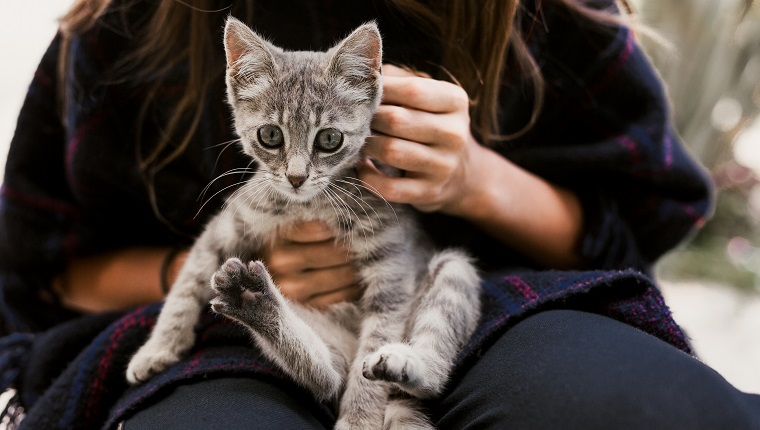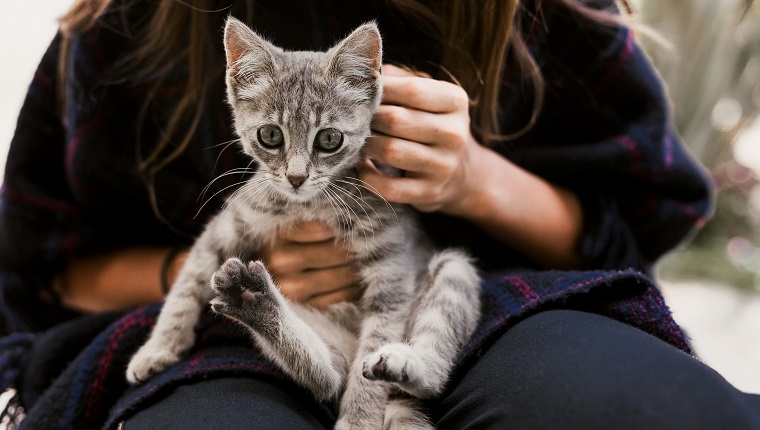
Lots of cats have a reputation for being shy, running to hide under the bed when guests come over, or refusing to come out of their carriers at the veterinary clinic. The good news is that, with some early socialization training, it doesn’t have to be that way.
Your cat might never have the open and outgoing nature of a Labrador Retriever, but they can learn to enjoy meeting people and being touched if you’re able to socialize them from an early age.
Here’s what you should know about kitten socialization.
What Is Socialization?

Socialization is the process of exposing a kitten to new experiences, sights, sounds, and people. That way, they’ll be less fearful and more outgoing as they grow to adulthood.
They’ll adapt to new people, pets, and situations more easily and confidently.
Between the ages of four and 14 weeks, a kitten’s brain has its greatest capacity for learning and memory. The things a kitten learns during this time will stick with them throughout life, so you want them to have lots of good experiences to help them grow up to be sociable and self-assured.
How Do I Tell If My Kitten Is Socialized?

Socializing a kitten is not quite the same as socializing a dog. “Kitten kindergarten” classes aren’t very common — or even really necessary — so what’s a kitten parent to do?
First, make sure your kitten comes from a stimulating environment. Whether they’re a random-bred tabby or a pedigreed Pixie-Bob, they should already be used to household sounds and being petted or held by people.
Kittens who aren’t handled or are handled very little before they’re ten weeks old are much more difficult to socialize.
It’s easy to tell if a kitten has a good start on socialization. They’re confident and seek out attention from people.
Socialized kittens don’t struggle when someone holds them, at least not very much, and they’re not afraid to play with toys, even if they haven’t seen them before. When they startle after hearing a loud or unexpected noise, they recover quickly.
How Do I Socialize A Kitten?

It’s ideal if your kitten stays with their mother and littermates until they’re at least twelve weeks old. Being with them through that age will ensure that they learn important lessons about being a cat and getting along with other cats, and they’ll still bond with you easily.
Once you bring your new kitten home, make sure they continue to meet lots of different people. A lot of times we think we’re doing a good job of socialization, but what’s really happening is that a kitten is meeting the same people over and over.
Expand their horizons. Give your cat a perch near a window to watch the humans who walk past. This can help get them used to the idea of seeing people and understanding that they’re just a normal part of the environment.
If your kitten needs a vet visit, ask any of the vets or vet techs at your clinic to give them an extra pat or a scratch on the head. The same goes for groomers or any other professional your cat needs to see.
Borrow a cat-friendly dog or two so they can get some cross-species exposure. Take them for car rides — just for fun. A trip to the drive-thru or to pick up an order from the store is just the thing for getting them comfortable with going places.
A kitten’s early experiences have the greatest influence on their personality, but don’t look at 14 weeks as a “best by” date. Exposing your cat to varied experiences, places, and people along with teaching them to do different things throughout their life can help keep their brain flexible.
Have you ever socialized a kitten? Do you have any tips to share? Let us know in the comments below!









